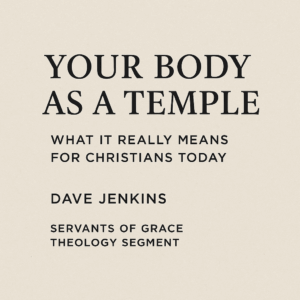On October 31, 1517, a monk with a mallet named Martin Luther pounded his message into the door of the Wittenberg Church: 95 theses challenging the Roman Catholic doctrine of salvation by works. So began the Protestant Reformation. Over 500 years later, we still cling to the tenets of that Reformation which we call the Five Solas. Picture the Protestant worldview as a magnificent atrium. The base of this atrium is the rock-solid foundation of Sola Scriptura: Scripture alone is our highest authority. Then, upon this foundation arise three pillars: Salvation is by grace alone (Sola Gratia), by faith alone (Sola Fide), and in Christ alone (Solus Christus). Atop these pillars rests the heavenly expanse of Soli Deo Gloria: All creation exists for the glory of God alone.
We rarely talk about foundations, of course. When you invite guests into your home, you don’t let them see your home’s foundation. You might show them your kitchen, dining room, or family pictures. The foundation is meant to stand unseen, but your entire house will be in trouble if it’s off. Likewise, the entire church faces disaster if we do not affirm Sola Scriptura.[1] Therefore, let us define Sola Scriptura, illustrate it in the Reformation, and apply it to today’s church.
Sola Scriptura Defined
Matthew Barrett provides a poignant definition of Sola Scriptura: “Only Scripture, because it is God’s inspired Word, is our inerrant, sufficient, and final authority for the church.”[2]
Scripture is Inspired
First, Scripture reveals itself to be God-inspired. This means that God is the Author of Scripture. Yes, he sovereignly ordained human authors to write the actual words, but God is the ultimate Author. According to 2 Peter 1:21, “No prophecy was ever produced by the will of man, but men spoke from God as they were carried along by the Holy Spirit.” Picture a mighty, rushing wind filling the sails of a boat and propelling it across the ocean. So also, these human authors, though writing in their own language and personal style, were carried along in this work by the mighty Spirit of God. “All Scripture is breathed out by God” (2 Tim 3:16a) and therefore without error, for “it is impossible for God to lie” (Heb 6:18b) and “every word of God proves true” (Prov 30:5a). Our God has never spoken a single wrong statement. He is infinitely perfect. Therefore, so also is his Word. As Luther wrote, “We know that God does not lie. My neighbor and I—in short, all men—may err and deceive, but God’s Word cannot err.”[3]
Scripture is Sufficient
God’s Word is first inerrant because it is inspired. Second, God’s Word is sufficient, which means it is enough. “All Scripture is breathed out by God and profitable for teaching, for reproof, for correction, and for training in righteousness, that the man of God may be competent, equipped for every good work” (2 Tim 3:16-17). Scripture teaches us truths to live by and reproves us when we stray. It corrects us onto the right path and trains us to walk in righteousness. Scripture is sufficient to transform God’s children into his glorious image-bearers. Scripture is enough; It is sufficient; It is competent to make you more and more like Jesus Christ.
Sufficient for Trials
So when you are either hiding from the shame of sin or in despair because of suffering, where do you turn for help? Do you turn to the manifold promises of God? Do you have God’s precious Word so hidden in your heart that it sets you free in moments of despair? When trials prick you, does the Bible bleed into your everyday conversations? Can you praise the Lord with the psalmist, “Your word is a lamp to my feet and a light to my path” (Ps 119:105)? Can you testify with Jesus, “Man shall not live by bread alone, but by every word that comes from the mouth of God” (Matt 4:4)? Can you declare with Paul, “Whatever was written in former days was written for our instruction, that through endurance and through the encouragement of the Scriptures we might have hope” (Rom 15:4)? Where you turn amid trouble is the place your hope resides.
Sufficient for Ministry
As Christians, we are also committed to Scripture alone as the foundation of our ministry, for God’s Word empowers us to care for every person in every situation. We claim God’s promise that “his divine power has granted to us all things that pertain to life and godliness” (2 Pet 1:3). Every essential truth—every indispensable principle for care for souls resides within the Word of God. We call this the sufficiency of Scripture. This does not mean, of course, that the Bible comments encyclopedically about everything. The Bible is not exhaustive, but it is surely comprehensive. As Luther declared, “This Word is the Word of life, of truth, of light, of preaching, of righteousness, of salvation, of joy, of liberty, of wisdom, of power, of grace, of glory, and of every blessing beyond our power to estimate.”[4] It is sufficient unto the end for which it was designed.
Scripture is Authoritative
Finally, God’s Word is authoritative. For if Scripture is inspired by a God who does not lie, then Scripture itself must be without error. If God’s inerrant Word is sufficient for “all things that pertain to life and godliness,” then Scripture must be our final authority. It is not our only authority but our final authority, and all other authorities must only be followed so much as they align with Scripture. Sola Scriptura does not mean the Bible is the only book we read; instead, it is the only authority over every book we read. Submission to God means submission to His Word, for when Scripture speaks, God speaks until our very obedience becomes an act of worship. We demonstrate our faith in God by obedience to his Word, and then we teach others to obey (Matt 28:20a).
The Roman Catholic Church in Luther’s day also affirmed the authority of Scripture, but they often gave the same level of inerrancy to popes and councils. Instead of Scripture alone, they claimed that Scripture and Tradition were equal in authority.[5] Consider the radical claim of Sola Scriptura as illustrated in the Reformation.
Sola Scriptura Illustrated
In 1517, Martin Luther protested the Church’s practice of selling indulgences. Back then, you could pay a certain sum, and the pope would promise to forgive your sins. You could also purchase indulgences for deceased loved ones—certificates authenticated by the pope himself to quicken their journey from purgatory to heaven. Even a traveling salesman, Johannes Tetzel, went from town to town with a catchy little jingle: “As soon as the coin in the coffer rings, the soul from purgatory springs.” So, Luther challenged the Church’s authority: “You do not have authority to forgive sins, let alone charge money for it. The Church only possesses authority so much as it submits to Scripture.” As one might expect, Luther soon became a thorn in the side of Rome. In 1519, two years after his 95 theses spread like wildfire across the German countryside, Luther debated a scholar named Johannes Eck, who questioned Luther, “Will you reject the doctrine of purgatory?” Luther rejected it, for purgatory was not taught in Scripture but derived from extra-biblical books called the Apocrypha.
Eck put forward the widely-held claim that: “the Scriptures are not authentic, except by the authority of the church.” In other words, “You need the Church to tell you what the Scriptures say. Purgatory is true because the pope says it’s true.”
Luther argued that Scripture has authority over popes, church fathers, and even church councils, all of whom have erred in the past. Therefore, not only is Scripture our infallible authority, but a schoolboy with Scripture in his hand is better fortified than the pope! As he contended for the truth, Luther finally realized that the authority of the Catholic Church and the authority of the Scriptures were in direct confrontation.
Eventually, in 1521, The Church called Luther to stand trial at the Diet of Worms. All his writings were laid on the table before him, and the prosecutor asked, “Are you prepared to recant what you have written in these books?” To this, Luther humbly replied: “Unless I am convinced by the testimony of the Scriptures or by clear reason (for I do not trust either in the pope or in councils alone, since it is well known that they have often erred and contradicted themselves), I am bound by the Scriptures I have quoted, and my conscience is captive to the Word of God. I cannot and will not retract anything, since it is neither safe nor right to go against conscience. I cannot do otherwise, here I stand, may God help me. Amen.”[6] Luther reasoned, “If I must choose between divergent opinions, then my final authority is Scripture alone. Here I stand!”
This claim was not original to Luther as our Lord Jesus first used the metaphor to conclude his Sermon on the Mount: “Everyone then who hears these words of mine and does them will be like a wise man who built his house on the rock. And the rain fell, and the floods came, and the winds blew and beat on that house, but it did not fall, because it had been founded on the rock” (Matt 7:24-25). So also, our rock-solid foundation must be the Word of God. Our final authority must be the teachings of Jesus, or when we face the hurricanes of life, our house will crumble to the ground. The Reformers understood that Scripture alone could be our final authority. Scripture alone was all-sufficient as the inspired and inerrant Word of God, and constructing our faith on the word of human authorities was like foolishly building a house on sand. For the church to stand, we must build our foundation on the Word of God. We must think biblically about everything pertaining to life and godliness. So, let us now apply Sola Scriptura to the church today.
Sola Scriptura Applied
Luther stood firmly upon Scripture at the Diet of Worms, yet on his way home, a gang of armed men surrounded him at sword point. These were Luther’s protectors who safely secured him from enemies seeking to take his life. Yet how did Luther occupy his time in forced seclusion? He translated the Bible into the common language of the German people. Luther believed so strongly that Christians must base their lives on Scripture that he labored to put those Scriptures into the hands of every person. It wouldn’t just do to hear Latin snippets at the Catholic mass or to have scholars studying Hebrew and Greek. The common people needed to hear and read the Bible in their own heart language. So, Luther labored at translating the Scriptures until, by his death in 1546, more than half a million copies of Scripture were in his people’s hands.
This effort may seem meaningless to us, who own multiple copies of the Bible. Yet, in those days, the Bible was such a treasured possession that persecuted Christians would cling to their Bibles even as they were being executed. Some of those Bibles in museums today still show bloodstains splattered across their pages, for martyred saints would give up their lives before giving up their Bibles.
Read your Bible
The first way to apply Sola Scriptura is to read your Bible. Open your Bible daily and eagerly learn what to apply. Shake every branch on this mighty tree of Scripture to find out what it means. If we truly believe that God’s Word is our final, all-sufficient authority for life and godliness, then we must honor God’s Word by reading it daily. That’s how Luther himself got saved when he read Romans 1:17 in its biblical context: “The righteous shall live by faith.”
Read the Bible personally, but also read the Bible publicly in the gathered church. As Paul instructs Timothy, “Until I come, devote yourself to the public reading of Scripture, to exhortation, to teaching” (1 Tim 4:13). Revere Scripture publicly with the honor it deserves. Open the lion’s cage and let the roar of God’s Word speak for itself.
Preach the Bible
Read the Bible, then also preach it. As Paul urges Timothy, “Preach the word; be ready in season and out of season; reprove, rebuke, and exhort, with complete patience and teaching” (2 Tim 4:2). Preacher, do not manipulate the Bible to teach your pet ideas which scratch the itching ear (see v. 3). Instead, subject your thinking to be shaped and transformed by the Word of God. Preach the Word as you explain the precise meaning of the text. Show the church why the Bible was originally written to the people of that day, then show how it applies to the people now. This bridge between two worlds is called Bible exposition and was the practice of Calvin, Luther, and all the Reformers. They led a resurgence of expository preaching, which had been lost for over a thousand years. The Reformers knew that Scripture alone could penetrate souls and change men’s lives. As Luther wrote, “People are not to believe me, the church, the fathers, the apostle, or even an angel from heaven if we teach anything contrary to the Word of God. But the Word of the Lord should stand forever.”[7] Preach the Word, for “God is speaking through the voice of the preacher who brings God’s Word.”[8]
If the Bible is our final authority, we must faithfully preach the Word even when it is out of season. In 1662, under the shadow of the Reformation, the British Parliament passed the Act of Uniformity—a law restricting the public preaching of God’s Word. Yet many preachers stood upon the authority of Scripture above the authority of the government. So, on August 24, 1662, two thousand pastors were put out of their pulpits in what became known as the Great Ejection. They could not preach within five miles of the city limits, so they took to preaching in the open fields. They were imprisoned and persecuted. And when they died, they were not even buried with honor: John Owen, Isaac Watts, John Bunyan, Thomas Goodwin, and many other giants of the Christian faith were buried outside the city limits with not even a headstone. Sadly, many pastors today have ceased preaching the Word of God under lesser persecution.
Yet what if your church today does not exposit the Bible? Then teach the Bible in your home. Study together with family and friends. Cultivate in the church a love for God’s Word. Meanwhile, encourage your pastor to be faithful. Pray for him as he studies. Ask good questions about whatever passage he is preaching. Like the Bereans, examine the Scriptures to hold your preacher accountable (e.g., Acts 17:10-11). Give honor to the one who preaches the Word, but search the Scriptures to see if what he says is true. And if you are starving from spiritual famine, then plead with your pastor to preach the Word.
Sing the Bible
We must also, in worship, sing the Bible in both spirit and truth (John 4:24). We sing the Word of God in spirit with rapturous joy enlivening our souls as we “make a joyful noise to the LORD” (Ps 100:1) and corporately express our love for God. True worship demands not only biblical lyrics but also passionate praise to God. Colossians 3:16 then reveals the fountainhead of our worship: “Let the word of Christ dwell in you richly, teaching and admonishing one another in all wisdom, singing psalms and hymns and spiritual songs, with thankfulness in your hearts to God.” What theology do we teach? What wisdom do we counsel? What psalms and hymns and spiritual songs spring forth from our souls? Paul grounds the church’s worship ministry in this one foundation: “Let the word of Christ dwell in you richly.” We are only filled with the Spirit when we are filled with the word of Christ (see Eph 5:18-19). We are only Spirit-controlled when we are Scripture-saturated, for God’s Spirit never speaks in conflict with his Word. Let us worship Christ in both spirit and truth.
Our songs of worship must lay the foundation of Scripture alone. So, when you sing, do not mindlessly mouth the words. Instead ask yourself: “What truth resounds within these lyrics? What biblical principles are being taught? Is my worship theology aligned with Scripture? Am I making a joyful noise unto the Lord?”
Pray the Bible
Also, commit yourself to pray the Bible. Talk to God with an open Bible. Pray Psalm 139, “Search me, O God, and know my heart! Try me and know my thoughts! And see if there be any grievous way in me, and lead me in the way everlasting!” (vv. 23-24). Claim 1 John 1:9, “If we confess our sins, he is faithful and just to forgive us our sins and to cleanse us from all unrighteousness.” Find your comfort in Philippians 4:13, “I can do all things through him who strengthens me.” Intercede for others with the language of Scripture. If God is not answering your prayers, then go back and check your theology. Learn to pray the Bible.
Counsel the Bible
Likewise, counsel the Bible. Many churches preach the Word as sufficient for “all things that pertain to life and godliness,” but when it comes to people’s personal, practical problems, the church often sends them away to receive help from the world. The church is unprepared. She is incompetent. She is lacking in compassion. The very church which affirms Sola Scriptura in preaching may sadly deny it by her failure to counsel biblically.
Suppose friends in your church are experiencing marital conflict, and they come to you for help: “We are desperate! How can we save our marriage?” Do you tell them you don’t know how to help—that you’re not a professional? Do you regurgitate advice you read in some book or heard on a radio show? Perhaps you resort to personal experience: “Well, you know, here are some things we did that seemed to work in our marriage.” Or do you remember that Scripture is God’s inspired, inerrant. authoritative Word, sufficient for “all things that pertain to life and godliness,” including marriage. You might encourage your friends, “Let’s search God’s Word together to see what God has to say about marriage. Let’s find help and hope for your troubled marriage in Scripture. Surely the Author of marriage has given us instructions for how to honor him as husband and wife.”
Our counsel to fellow Christians must be biblical, for Scripture alone has authority in counseling. So if you don’t know your Bible well enough, it’s time to learn. Ignorance is no excuse for incompetence when fellow believers in our churches are dying for lack of counsel. As Paul exhorts the ordinary Christians in Rome with his confidence in Christ: “I myself am satisfied about you, my brothers, that you yourselves are full of goodness, filled with all knowledge and able to instruct one another” (Rom 15:14). Paul encourages the church, “You possess the character of Christ. You have learned the wisdom of Christ. You are competent in Christ to counsel others. So church, let us proclaim the Word publicly and counsel the Word personally.
Live out the Bible
Finally, we must live out the Bible ourselves. Throughout history, the threat to Sola Scriptura always boils down to man’s attempt at replacing God. Instead of Scripture plus Tradition, the danger today is Scripture plus personal experience or Scripture plus personal preference. Too many Christians whine, “I know that’s what the Bible says, but…” because we have elevated ourselves as gods above Scripture. The authority in my life is too often “me.” As a father, I idolize my children. As a husband, I expect my wife to meet my every need. As a pastor, I find identity in ministry. As a student, good grades have become my highest goal. My heart is a factory of idols, for every one of us is an idolater.
Yet listen to Luther’s advice for one facing temptation: “Such a person must by no means rely on himself, nor must he be guided by his own feelings. Rather, he must lay hold of the words offered to him in God’s name, cling to them, place his trust in them, and direct all the thoughts and feelings of his heart to them.”[9] God calls us to live in submission to his Word as “doers of the Word” who conform our lives to Scripture (Jas 1:22). We study and learn, “Thus saith the Lord.” Then we commit to applying those biblical truths, no matter how difficult or inconvenient. Thus, the implanted Word of God will save our souls (v. 21), for we discover Christ in God’s Word. God’s Word exposes our sin and reveals our idolatrous heart (Rom 3:23). God’s Word exalts his holiness and the warning of certain judgment (6:23a). God’s Word proclaims that God became a man, then came in human form to die upon a cross and pay the penalty we deserved (5:8). God’s Word declares the sinner righteous and sets the idolater free (8:1). God’s Word then rejoices with Paul, “I have been crucified with Christ. It is no longer I who live, but Christ who lives in me. And the life I now live in the flesh I live by faith in the Son of God, who loved me and gave himself for me” (Gal 2:20).
Scripture is the inspired Word of God that changes lives and the inerrant Word of God, “reviving the soul” (Ps 19:7a). It is the all-sufficient Word of God able to equip believers for every good work (2 Tim 3:16-17) and the authoritative Word of God which we must obey and teach others to obey as well (Matt 28:20). As Luther testified, “I simply taught, preached, and wrote God’s Word; otherwise I did nothing. And while I slept . . . the Word so greatly weakened the papacy that no prince or emperor ever inflicted such losses upon it. I did nothing; the Word did everything.”[10] May that spirit of the Reformation live on in the church today.
References
[1] Sadly, less than half of Protestants today affirm Sola Scriptura http://www.pewforum.org/2017/08/31/after-500-years-reformation-era-divisions-have-lost-much-of-their-potency.
[2] Matthew Barrett, God’s Word Alone: The Authority of Scripture (Grand Rapids: Zondervan, 2016), 23.
[3] Martin Luther, Large Catechism (1529).
[4] Martin Luther, “A Treatise on Christian Liberty,” in Three Treatises (Philadelphia: Muhlenberg Press, 1947), 23.
[5] R. C. Sproul argues that “at the center of the whole dispute [the Reformation] was the question of authority, specifically the question of the authority of Scripture” (R. C. Sproul, Are We Together? A Protestant Analyzes Roman Catholicism [Orlando, FL: Reformation Trust, 2012], 11-12).
[6] Martin Luther, Luther’s Works, vol. 32, ed. George W. Forell (Philadelphia: Fortress, 1958), 113.
[7] Martin Luther, D. Martin Luthers Werke: Kritische Gesammtausgabe, 40:132, quoted in What Luther Says: An Anthology, vol. 3 (St. Louis, MO: Concordia Publishing House, 1959), 1479.
[8] Martin Luther, Luther’s Works, vol. 22, ed. Walther I. Brandt (St. Louis: Concordia, 1962), 527.
[9] Martin Luther, “Luther’s Works,” vol. 42: Devotional Writings (Philadelphia: Fortress Press, 1969), 183.
[10] Martin Luther, The Table Talk of Martin Luther (Ross-Shire, Scotland: Christian Focus, 2003), 116.
Tom Sugimura pastors New Life Church in Woodland Hills, CA. He trains church planters, international pastors, and biblical counselors. He has also authored two books, Hope for New Dads and God’s Answers to Life’s Most Difficult Questions. He and his wife, Amanda, are busy raising four rambunctious children.







